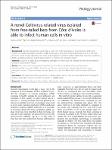A novel Coltivirus-related virus isolated from free-tailed bats from Côte d’Ivoire is able to infect human cells in vitro
Weiss, Sabrina
Dabrowski, Piotr Wojtek
Kurth, Andreas
Leendertz, Siv Aina J.
Leendertz, Fabian H.
Background: Zoonotic transmission events play a major role in the emergence of novel diseases. While such events are virtually impossible to predict, wildlife screening for potential emerging pathogens can be a first step. Driven by recent disease epidemics like severe acute respiratory syndrome (SARS), Middle East respiratory syndrome (MERS), and Ebola, bats have gained special interest as reservoirs of emerging viruses. Methods: As part of a bigger study investigating pathogens in African bats we screened animals for the presence of known and unknown viruses. Results: We isolated and characterised a novel reovirus from blood of free-tailed bats (Chaereophon aloysiisabaudiae) captured in 2006 in Côte d’Ivoire. The virus showed closest relationship with two human pathogenic viruses, Colorado tick fever virus and Eyach virus, and was able to infect various human cell lines in vitro. Conclusion: The study shows the presence of a coltivirus-related virus in bats from Sub-Sahara Africa. Serological studies could help to assess its impact on humans or wildlife health.
No license information

